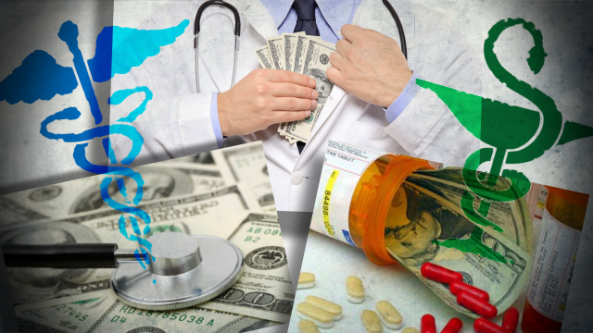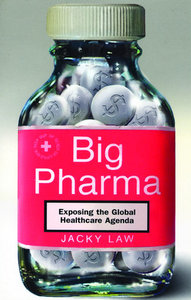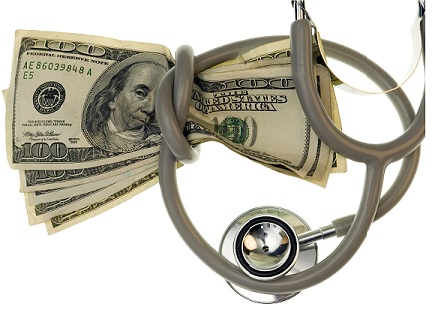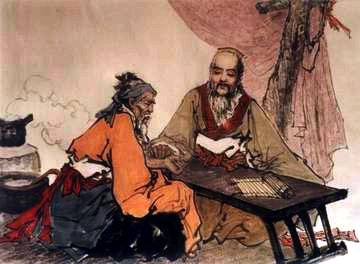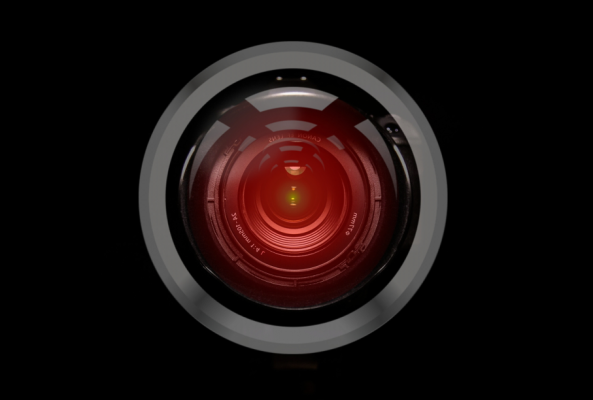This is a controversial issue that provokes strong reactions and often unthinking.
We could consider almost like a taboo subject in our society, because we are faced with one of those "inviolable truths" and commonly accepted that hold the system upright.And everything starts from a very simple question ...How to make money a doctor or a pharmacist?And to answer this question leads us headlong into one of the most absurd paradoxes of today's world.It turns out that your doctor or your pharmacist only make money when you're sick.In fact, the whole industry of medicine and pharmacy earn money with the disease.At this point, a mind with a minimum capacity of reasoning should ask if the medicine and pharmacy make money with the disease what interest can have these large industries we are healthy?It is so logical and obvious argument is outrageous and even discouraging anyone wants to accept it as a reality.To better understand the implications of this reasoning, we delve a little more, using the simplest logic.If we relate the business of medicine and pharmacy with the status of their patients, we will see that their profits are settled through 3 basic equations:SICK MONEY =
HEALTHY = POSSIBLE FUTURE EARNING
DEAD = GAIN VOIDThat draw 2 outlines basic business:A-In the first , money is earned thanks to the cyclical alternation in Sano-Ill status of patients. A greater frequency in the appearance of the state "sick" greater opportunities for cyclical income. B-In the second , even more optimal, money is earned by continued disease over time, ie, chronic disease.
In both cases, it is essential to provide adequate quality of life for the patient to continue defraying the treatment and above all, avoid or postpone death, as this would mean the end of income.It is clear therefore that full health, in no way implies earnings.Instead, the disease always guaranteed.We know that this is a shocking argument, but more laps we give it, is pure reality.Maybe we should stop qualifying medicine and pharmacy as "health sciences" and start calling them "science of the disease", right?Obviously, we are not saying that doctors are not interested in the health of their patients or that promote the spread of disease.Doctors, as people and as professionals want the best for their patients and apply all their knowledge, from education received in restoring health to the sick.But the key lies precisely here. In the education received by physicians. That is, in how they have been transmitted to them knowledge.The truth is that since access to the medical school are trained and educated to be part of the medical-pharmaceutical industry and adapt to its logical operation, in the same way that a soldier is trained and educated to join an army and adapt to its logical operation.Following the same logic, the pharmaceutical industry earns huge amounts of money from the disease, in the same way that the arms industry earn huge amounts of money from the war.And reaching here, it would not be very naive to think that the pharmaceutical industry promotes health? Or is it perhaps someone imagines an arms manufacturer promoting peace in the world?As we see, the relationship and the influence of the arms industry over the military world, is analogous to that exerted by the pharmaceutical industry on the world of medicine. Both industries instrumentalize those who "use their products" in the exercise of their professional performance.It is foolish to think that will use part of its immense economic power to influence or programming education of doctors and pharmacists, who tomorrow must continue to ensure that the business scheme continue.It is therefore logical to think that all knowledge on medicine and pharmacy is geared to suit the business logic "disease = money".No doubt there will be readers who will be pulling your hair out of your head.To begin with, because accept this reality collides with their most deeply held views.It would be tantamount to admitting that science can be perverted by love of money.Something unthinkable in the innocent minds of many people, who believe that the world of science is something pure and unharmed, populated by wise and upright men who like angels dressed in white coats, put his intellect at the service of human welfare selflessly.To these people, we should remind you that ALL the world's weapons, both conventional and mass destruction have been created by scientists. All environmental disasters from oil spills to chemical or radioactive contamination would have been impossible without the direct involvement of the scientific world, serving the most unbridled greed.The world of science is not composed of superior beings, but by normal people, so corrupt, greedy and unconscious as it can be any other human group.But back to focus again on the world of medicine and the perverse logic "disease = money" and the arguments that can be held against this claim.No doubt there will be many people who will say that: "the disease is inherent to human life and nature and activity of medicine consists precisely in fighting the disease"That is to say, will conclude that the role of the medical and pharmaceutical industries is to fight against diseases and therefore a logical and natural, the inevitable appearance of the disease brings benefits to both industries, without them having to blame for it .But is it possible that medicine and pharmacy focus your efforts and your business on health and not on the disease?Let's reason it out.For this model to be feasible, the doctor should only make money while the patient was healthy.And stop win him while he was sick.3 above equations medical-pharmaceutical business would become the following:GAIN ILL = NULL
HEALTHY = MONEY
DEAD = GAIN VOIDThus, the medical focus their efforts on their patients maintain health all the time, preventing disease before it appeared and therefore studying and addressing its causes rather than their consequences .And if the patient fell ill, the doctor would endeavor to return as soon as possible to its healthy state, to earn money back with him and keep their professional standing.The pharmacist's role would be complementary and would basically provide those products needed to strengthen and prolong the patient's health, and if, necessary to combat the disease when it appeared.As we can see, according to this model, the pharmacist would be more related to the world of nutrition with chemistry.This way of working, that many people may seem fanciful, and has worked previously.Recall that in ancient China, doctors were paid a salary to keep their patients healthy and stopped perceive when they became ill, a fact that negatively affected their professional prestige and therefore in profits.Do you think, then, an absurd model?Need more absurd than a medical-pharmaceutical industry that makes money only when you are sick?Clearly, as our society is structured, this model is very difficult to apply, despite being much more logical and potentially beneficial to the patient.And when they arrived here, perhaps we should ask why since its inception medicine opted for a model in which the gain is associated with the disease, not health?And the answer can not be sadder: everything revolves around power .The disease is an exceptional period of crisis in the life of a person, in which the sick, desperate, is willing to give or pay whatever it takes to save his life and the doctor stands as the only figure capable to to get it.For that reason the medicine focuses on disease, because it is the most critical situation involves grabbing power and authority flowing from the patient to the doctor.We have seen throughout history, where even kings and emperors have bowed to their doctors.However, if the medicine focus its efforts in maintaining the health of the patient, the crisis associated with the disease run against the doctor, because during its course lose social prestige and desaprovecharía that unique opportunity in which the patient is willing to give more money, power and authority to your doctor.Therefore, medicine has not evolved around the concept of health; it has about authority and social prestige.
And profits they entail.And these benefits can only be obtained through the disease .A completely opposite operation than it should be.This is the great contradiction of medicine.It is based on simple mechanisms so that anyone can understand.However despite having it in front of our noses, the world is closing its eyes to this reality so obvious.And it is that the world is not full of blind, but people who do not want to open my eyes ...GAZZETTA THE APOCALYPSEThis is an excerpt of the article: WHAT NOBODY WANT TO SEE
Translate
6 de abril de 2016
THE GREAT CONTRADICTION OF MEDICINE (no one wants to face)
LA GRAN CONTRADICCIÓN DE LA MEDICINA (que nadie quiere afrontar)
Este es un asunto controvertido, que provoca reacciones airadas y muchas veces irreflexivas.Podríamos considerarlo casi como un tema tabú en nuestra sociedad, pues nos enfrenta con una de esas “verdades inviolables” y comúnmente aceptadas que sostienen el Sistema en pie.Y todo arranca de una pregunta bien simple…¿Cómo gana dinero un médico o un farmacéutico?Y es que responder a esta pregunta nos lleva de cabeza a una de las paradojas más absurdas del mundo actual.Pues resulta que tu médico o tu farmacéutico solo ganan dinero cuando estás enfermo.De hecho, toda la industria de la medicina y la farmacia ganan dinero gracias a la enfermedad.Llegados a este punto, una mente con una mínima capacidad de raciocinio debería preguntarse: si la medicina y la farmacia ganan dinero con la enfermedad ¿qué interés pueden tener estas grandes industrias en que estemos sanos?Es un argumento tan lógico y obvio que resulta indignante y incluso descorazonador que nadie quiera aceptarlo como una realidad.Para comprender mejor las implicaciones de este razonamiento, profundicemos un poco más, utilizando la lógica más simple.Si relacionamos el negocio de la medicina y la farmacia con el estado de sus pacientes, veremos que sus ganancias se dirimen a través de 3 ecuaciones básicas:ENFERMO = DINERO
SANO = POSIBLE GANANCIA FUTURA
MUERTO = GANANCIA NULAEso dibuja 2 esquemas de negocio básicos:A-En el primero, se gana dinero gracias a la alternancia cíclica en el estado Sano-Enfermo de los pacientes. A mayor frecuencia en la aparición del estado “enfermo”, mayores oportunidades de ingreso cíclicas.
B-En el segundo, aún más óptimo, se gana dinero gracias a la enfermedad continuada en el tiempo, es decir, a la enfermedad crónica.En ambos casos, es esencial ofrecer la suficiente calidad de vida al paciente para que siga sufragando el tratamiento y ante todo, evitar o posponer su muerte, pues ésta significaría el fin de los ingresos.Queda claro pues, que la salud completa, en ningún caso implica ganancias.En cambio, la enfermedad, siempre las garantiza.Sabemos que éste es un argumento chocante, pero por más vueltas que le demos, es la pura realidad.Quizás deberíamos dejar de calificar a la medicina y a la farmacia como “ciencias de la salud” y empezar a llamarlas “ciencias de la enfermedad”, ¿no?Evidentemente, no estamos diciendo que los médicos no se interesen por la salud de sus pacientes o que promuevan la proliferación de enfermedades.Los médicos, como personas y como profesionales quieren lo mejor para sus pacientes y aplican todos sus conocimientos, procedentes de la educación recibida, en devolver la salud a las personas enfermas.Pero la clave reside precisamente aquí. En la educación recibida por parte de los médicos. Es decir, en cómo se les han transmitido los conocimientos.Porque lo cierto es que desde que acceden a la facultad de medicina, son entrenados y educados para formar parte de la industria médico-farmacéutica y adaptarse a sus lógicas de funcionamiento, de la misma forma que un soldado es entrenado y educado para formar parte de un ejército y adaptarse a sus lógicas de funcionamiento.Siguiendo estas mismas lógicas, la industria farmacéutica gana inmensas cantidades de dinero gracias a la enfermedad, de la misma manera que la industria armamentística gana inmensas cantidades de dinero gracias a la guerra.Y llegados hasta aquí, ¿no resultaría muy ingenuo pensar que la industria farmacéutica promueve la salud? ¿O es que acaso alguien imagina a un fabricante de armas promoviendo la paz en el mundo?Como vemos, la relación y la influencia que ejerce la industria armamentística sobre el mundo militar, es análoga a la que ejerce la industria farmacéutica sobre el mundo de la medicina. Ambas industrias instrumentalizan a aquellos que “usan sus productos” en el ejercicio de su desempeño profesional.No es disparatado pensar que utilizarán parte de su inmenso poder económico en influir en la educación o programación de los médicos y los farmacéuticos, aquellos que el día de mañana deberán seguir garantizando que el esquema de negocio continúe.Así pues, es lógico pensar que todo el conocimiento relativo a la medicina y a la farmacia está orientado para adaptarse a la lógica de negocio “enfermedad=dinero”.Sin duda habrá lectores que se estarán tirando de los pelos de la cabeza.Para empezar, porque aceptar esta realidad choca con sus concepciones más profundamente arraigadas.Sería tanto como admitir que la ciencia puede pervertirse por amor al dinero. Algo inconcebible en la mente inocente de muchas personas, que creen que el mundo de la ciencia es algo puro e incólume, poblado por hombres sabios e íntegros que como ángeles ataviados con batas blancas, ponen su intelecto al servicio del bienestar humano de forma desinteresada.A estas personas, deberíamos recordarles que TODAS las armas del mundo, tanto convencionales como de destrucción masiva han sido creadas por científicos. TODOS los desastres ambientales, desde los vertidos petrolíferos hasta la contaminación química o radiactiva, habrían sido imposibles sin la implicación directa del mundo científico, al servicio de la codicia más desenfrenada.El mundo de la ciencia no está formado por seres superiores, sino por personas normales, tan corruptas, codiciosas e inconscientes como lo pueda ser cualquier otro colectivo humano.Pero volvamos a centrarnos de nuevo en el mundo de la medicina y en la perversa lógica “enfermedad=dinero” y a los argumentos que pueden esgrimirse en contra de ésta afirmación.Sin duda, habrá muchas personas que afirmarán que: “la enfermedad es consustancial a la vida humana y a la naturaleza y que la actividad de la medicina consiste, precisamente, en luchar contra la enfermedad”Es decir, concluirán que el cometido de las industrias médica y farmacéutica es luchar contra las enfermedades y que por lo tanto, de forma lógica y natural, la inevitable aparición de la enfermedad reporta beneficios a ambas industrias, sin que ellas tengan la culpa de ello.¿Pero sería posible que la medicina y la farmacia centraran sus esfuerzos y su negocio en la salud y no en la enfermedad?Vamos a razonarlo.Para que este modelo fuera factible, el médico solo debería ganar dinero mientras el paciente estuviera sano.Y dejar de ganarlo mientras estuviera enfermo.Las 3 anteriores ecuaciones del negocio médico-farmacéutico se transformarían en las siguientes:ENFERMO = GANANCIA NULA
SANO = DINERO
MUERTO = GANANCIA NULAAsí, el médico centraría sus esfuerzos en que sus pacientes mantuvieran la salud todo el tiempo, previniendo la enfermedad antes de que ésta apareciera y por lo tanto estudiando y atacando sus causas y no susconsecuencias.Y en el caso de que el paciente cayera enfermo, el médico se esforzaría en devolverlo lo más pronto posible a su estado saludable, para volver a ganar dinero con él y mantener su prestigio profesional.El papel del farmacéutico sería complementario y consistiría, básicamente, en suministrar aquellos productos necesarios para fortalecer y prolongar la salud del paciente, y en su caso, los necesarios para combatir la enfermedad cuando ésta apareciera.Como podemos deducir, según este modelo, el farmacéutico estaría más relacionado con el mundo de la nutrición que con el de la química.Esta forma de funcionar, que a mucha gente le puede parecer fantasiosa, ya ha funcionado con anterioridad.Recordemos que en la antigua China, los médicos cobraban un salario por mantener sanos a sus pacientes y dejaban de percibirlo cuando éstos enfermaban, hecho que repercutía negativamente en su prestigio profesional y por lo tanto, en sus ganancias.¿Te parece, pues, un modelo absurdo?¿Más absurdo que una industria médico-farmacéutica que sólo gana dinero cuando estás enfermo?Evidentemente, tal y como está estructurada nuestra sociedad actual, este modelo resulta muy difícil de aplicar, a pesar de resultar mucho más lógico y potencialmente beneficioso para el paciente.Y llegados aquí, quizás deberíamos preguntarnos: ¿porqué desde sus inicios la medicina optó por un modelo en el que la ganancia se asocia a la enfermedad y no a la salud?Y la respuesta no puede ser más triste: todo gira alrededor del poder.La enfermedad es un período excepcional de crisis en la vida de una persona, en la que el enfermo, desesperado, se muestra dispuesto a ceder o pagar lo que sea necesario para salvar su vida y el médico se erige en la única figura con capacidad para conseguirlo.Por esa razón la medicina centra su actividad en la enfermedad, porque es la situación crítica que implica mayor acaparamiento de poder y autoridad, fluyendo desde el paciente hacia el medico.Lo hemos visto a lo largo de la historia, donde incluso reyes y emperadores se han inclinado ante sus galenos.En cambio, si la medicina centrara sus esfuerzos en mantener la salud del paciente, la situación de crisis asociada a la enfermedad correría en contra del médico, pues durante su transcurso perdería prestigio social y desaprovecharía esa oportunidad única en la que el enfermo está dispuesto a conceder mayor dinero, poder y autoridad a su médico.Por lo tanto, la medicina no ha evolucionado alrededor del concepto de salud; lo ha hecho alrededor de la autoridad y el prestigio social.
Y de las ganancias que éstos acarrean.Y estos beneficios solo se pueden obtener a través de la enfermedad.Un funcionamiento completamente opuesto al que debería ser.Ésta es la gran contradicción de la medicina.Se basa en mecanismos tan simples que cualquier persona puede entenderlos.Sin embargo y a pesar de tenerlo enfrente de nuestras narices, el mundo sigue cerrando los ojos a ésta realidad tan obvia.Y es que el mundo no está lleno de ciegos, sino de personas que no quieren abrir los ojos…GAZZETTA DEL APOCALIPSISÉste es un fragmento del artículo: LO QUE NADIE QUIERE VER
Panama papers, gürtel plot
Correa visited Panama at least 26 times between 2004 and 2008
The Spanish justice also asked about a possible request for nationality Bonnet Gürtel in the Central American country FRANCISCO MEDINA
Francisco Correa, the principal involved in the plot Gürtel, turned their trips to Panama into a routine that during the years of greatest splendor of the plot, rather appeared to convert the Madrid-Panama in their particular aerian bridge.
In fact, as stated in one of the volumes of the indictment in the High Court on the activities of Correa, only in his last year released, 2008, perhaps it besets because I knew that justice was on his trail, man-Gürtel He traveled to Panama on seven occasions.
26 trips in just four years
Of course, as a document of the National Directorate of Immigration and Naturalization of the Ministry of Government and Justice of Panama between 2004 and 2008, Francisco Correa entered his country at least 26 times. Many of them, incidentally, not only flying from Spain but also from the United States and, on one occasion, from Colombia.
This entire period, the year 2007 was in most cases Correa traveled to Panama to nine times. He traveled in four in 2006 and three in 2005 and 2004 to the total of 26 trips that seemed more menudear as their legal situation was complicated.
Double nationality
In fact, many trips to Panama evidently aroused the curiosity of the Spanish justice, which made numerous requests to the justice of that country about the adventures of Francisco Correa there. Moreover, at a certain moment, the police and the Spanish prosecution alleged corruption detected movements Correa to try to get dual citizenship. Suspicious activity that led them to send a rogatory to the Panamanian authorities, who conducted investigations turn which were derived at least some illicit efforts by a local law office.
The conviction of justice was that Correa was moving to settle in that country to evade the Spanish police actions. A society Panamanian screen So far in so-called 'papers Panama' has not been implicated directly to Francisco Correa, or any other person involved in the Gürtel, but does appear in the summary of the High Court that the lawyer's office Mossack Fonseca I think in that country for Correa himself and the former mayor of Boadilla del Monte, Arturo González Panero, the albondiguilla, along with two other people, a society screen, Itelsa. Society was liquidated shortly afterwards and whose funds were distributed among other companies involved screen.
Catalonia holds with its economy to Spain
Oriol Junqueras: the Spanish deficit is based "largely" in the Catalan growth
The Minister of Economy of the Generalitat, Oriol Junqueras, said Wednesday that the Spanish deficit growth is based "largely on economic growth there in Catalonia".
In response to a question from JxSí in the control session the Government, he said that the Catalan economy grew 3.4% in 2015, while the deficit was 1.9%: "It is clear that the economy grew much more that debt, while the Spanish state debt grows much more than the economy. " Thus, it has been argued that the State's indebtedness represents 100% of GDP and that its increase depends on the Catalan economy continues to grow, so has asked the central government to note that "the growth of the Catalan economy is good for all the world".
Source: Europa Press
An old Strauss-Kahn company created 31 companies in tax havens
An old company Strauss-Kahn created 31 companies in tax havens
A fund of Luxembourg investment, chaired until 2014 by the manager former director of the IMF Dominique Strauss-Kahn, helped set up 31 companies in tax havens A fund of Luxembourg investment, chaired up 2014 by the former director manager IMF Dominique Strauss-Kahn, helped set up 31 companies in tax havens, the newspaper 'Le Monde' thanks to the data obtained in the 'papers Panama'. The Leyne, Strauss-Kahn & Partners (LSK) fund, created by his partner Thierry Leyne, opened and managed companies in havens such as the Seychelles, Panama, Hong Kong or the Virgin Islands for clients such as French investors Asian or rich audiovisual producers, adds the newspaper. the fund served its subsidiary Assya Asset Management Luxembourg (AAML) to operate those companies whose data appears in the leaked documents Panamanian law firm Mossack Fonseca. Most of these structures opened domiciled bank accounts in Switzerland, Luxembourg, Panama and Hong Kong with the alleged aim of "hide the real identity of the beneficiaries of the funds , " adds Le Monde. However, it specifies that the activity of AAML dates back to before the arrival of Strauss-Kahn to LSK presidency in October 2013. Just a few months earlier, the former director of the International Monetary Fund (IMF) attacked before the French Senate "unjust consequences" of the tax havens, which "deprive the state of tax revenues". at the same time, the former economy minister criticized those "financial instruments founded on opacity" which is "very destabilizing". In March, the French prosecutor has opened a judicial inquiry into LSK by organized fraud and abuse of social goods and trusted band. LSK left a liability of about 100 million euros and a total of 150 creditors, many of them attracted by the aura of solvency attributed to French politician
WHY IS IT SO JUSTICE "SOFT"
It is a reality that every day we see on the news and makes us angry.
Unscrupulous murderers, murderers of all kinds, cruel and despicable rapists and fraudsters are judged unaccountably later released. Sometimes it is because of errors in the procedure, others for lack of evidence or contamination, and sometimes just seems that to the judge on duty the pot has gone completely.
And it is especially bleeding cases in which, moreover, is a recidivist criminal. When it comes to a person who, despite not being rehabilitated in any way, is released and a few days comes the news that has found a new victim to that attack, kill or rape.
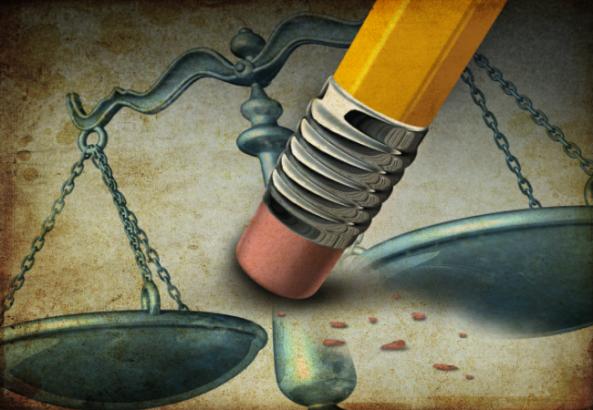
All this leads to say to many people, and with a point of reason, that the Spanish justice is too soft, that is too garantista . Our legislation tends to protect the criminal and leaves too completely helpless victims and their families. And in fact, all now come to mind the image of a desolate Sevillian family has spent years waiting for justice for the murder of his daughter.
But there is a question to ask ... our righteousness is as guarantor for those who break the law?
Recall that persons have been sentenced to prison for writing tweets of 140 characters for refusing to demolish their house or even steal a chicken (true) in Spain. People like Miguel Montes Neiro, who have spent 36 years in jail despite having no violent crime, or the creator of a website sentenced to 6 years in prison for "violating intellectual property" downloads.
The Spanish penal code, contrary to what many people think, is one of the toughest in Europe. So the problem is not that the law is too soft. The problem is in how it is applied . And besides, itseems that justice is particularly lax only in those cases highly media and spread terror among the population when dealing with murderers, rapists or child molesters.
But why does this happen? Are our judges are idiots, or they feel sorry for criminals and a strong commitment to human rights?
Let's stop for a moment. What happens when someone with serious crimes has been released?
The first effect is that we think that "justice should be tougher." It comes to mind that should open more prisons, that the penalties should be longer, and even that torture is necessary to obtain certain confessions and that should allow the death penalty.
This is a first psychological reaction of the population. But then comes the second effect ... and that is, obviously, to be released very dangerous people indeed increases insecurity in the streets, or at least perceived by society as well.
What they never tell us is that this is a propitious for subjecting the population to a new level of vigilance and alienation, under the pretext of "security" culture. If in our peaceful city released suddenly a murderer vicious serial wreaked havoc decades ago, if every day we see in the news cases of people assaulted or raped in the street without the guilty tread jail ... who is not afraid ?
It is the perfect strategy to slowly lead to the sheepfold. If we have so lethargic, so inefficient and so liberal justice that leaves dangerous criminals on the streets ... We'll have to do something to protect us , right? And here comes into play juicy and profitable billion dollar industry of private security .
And we do not know to what extent can the intrusion of private security in our lives ...
In a few years, everyone, regardless of age or social class, all have cameras recording in our own homes that will monitor everything we do at all times, for our safety . Unknowns looking across the target what you do in your most private moments , that are not your guardian angels but employees of a company to which your security actually gives a horn and you're looking to make a profit ... And if you have to sell the information from the cameras to another company to send you advertising, a scammer to know your habits or any state agency to monitor a possible dissenting attitude on your part ... neglected, it will. Money calls to money.
The worst thing is that this big brother who will look at us from every corner of our house we have not installed to force the minions of a totalitarian dictator ... What we have done by themselves , so confident and so happy!
Like so confident we climbed our most intimate and confidential one thing files called "cloud" ... Curious name for what are actually other people 's computers , as such, can hack and spy on their contents.
Repression does not come as a dictator gives a coup and boots of their soldiers tread the head of the terrified citizens ... The repression comes when, through psychological warfare , citizens we are manipulated to ask for more repression , and it is then slowly cold and we provide small doses of censorship, surveillance, control ... until the drug safety has completely killed that free human being that we all have inside.
Everything indicates that the future is so ... And in the meantime, what can we do? For the moment, do not fall into their trap: stop thinking that justice works so badly by pure chance or clumsiness of judges and start asking who gets benefits with this. And as someone continues to derive benefit, Neglect: that nothing will "harden" the laws or including life imprisonment in the penal code.
Suscribirse a:
Entradas (Atom)
Entrada destacada
PROYECTO EVACUACIÓN MUNDIAL POR EL COMANDO ASHTAR
SOY IBA OLODUMARE, CONOCIDO POR VOSOTROS COMO VUESTRO DIOS Os digo hijos míos que el final de estos tiempos se aproximan. Ningú...

-
Jose Park
-
U.S. Marines arrested disgraced California Governor Gavin Newsom on 1 November, delivering another major blow to the Deep State hegemony’s p...
-
💥💥LA LISTA ES INMENSA!😱😱😱 Los tribunales arrestan a estas personas vestidas de civil. Vimos el arresto de Obama. El arresto se llevó ...

